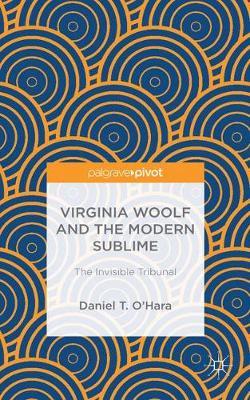Full Product Details
Author: Daniel T. O'Hara
Publisher: Palgrave Macmillan
Imprint: Palgrave Macmillan
Dimensions:
Width: 14.00cm
, Height: 1.10cm
, Length: 21.60cm
Weight: 0.454kg
ISBN: 9781137590596
ISBN 10: 1137590599
Pages: 123
Publication Date: 29 October 2015
Audience:
College/higher education
,
Postgraduate, Research & Scholarly
Format: Hardback
Publisher's Status: Active
Availability: In Print

This item will be ordered in for you from one of our suppliers. Upon receipt, we will promptly dispatch it out to you. For in store availability, please contact us.
Reviews
Virginia Woolf was not only one of the twentieth-century's great writers, but also one of its greatest readers. In Virginia Woolf and the Modern Sublime, O'Hara demonstrates how Woolf's sensitive readings help to shape the exquisite character and sublime power of her own prose, which frequently combines the specific detail of modern experience with a romantic grandeur associated with an earlier epoch. In addressing Woolf's multifaceted oeuvre, O'Hara deftly moves between the philologist's meticulous close reading of important texts and a broadly philosophical or speculative approach that draws upon Longinus, Kant, Nietzsche, and Harold Bloom, among others. O'Hara's deep, sympathetic knowledge of romanticism informs his revisionary interpretation of Woolf's peculiar literary modernism. As a result, O'Hara's study produces an aesthetically and historically rich understanding of not just Woolf's own corpus but also of the power of literature to shape ourselves and the worlds we inhabit. - Robert T. Tally Jr., Associate Professor of English, Texas State University, USA
One of the century's great writers, Virginia Woolf was also one of its greatest readers. In Virginia Woolf and the Modern Sublime: The Invisible Tribunal, Daniel O'Hara demonstrates how Woolf's sensitive readings shape the exquisite character and sublime power of her own prose, which frequently combines the specific detail of modern experience with a grandeur associated with an earlier epoch. O'Hara's grounding in romanticism informs his revisionary interpretation of Woolf's modernism. As a result, O'Hara's study produces an aesthetically and historically rich understanding of not just Woolf's own corpus but also of the power of literature to shape ourselves and the worlds we inhabit. - Robert T. Tally Jr., Associate Professor of English, Texas State University, USA
One of the century's great writers, Virginia Woolf was also one of its greatest readers. In Virginia Woolf and the Modern Sublime: The Invisible Tribunal, Daniel O'Hara demonstrates how Woolf's sensitive readings shape the exquisite character and sublime power of her own prose, which frequently combines the specific detail of modern experience with a grandeur associated with an earlier epoch. O'Hara's grounding in romanticism informs his revisionary interpretation of Woolf's modernism. As a result, O'Hara's study produces an aesthetically and historically rich understanding of not just Woolf's own corpus but also of the power of literature to shape ourselves and the worlds we inhabit. Robert T. Tally Jr., Associate Professor of English, Texas State University, USA
Author Information
Daniel T. O Hara, Professor of English and Inaugural Mellon Term Professor of Humanities at Temple University, USA.




